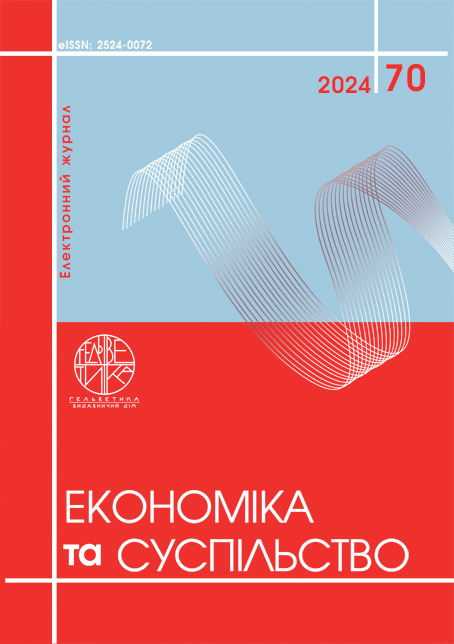GREEN AND DIGITAL LEADERSHIP AND THEIR IMPACT ON THE EFFICIENCY OF IMPLEMENTING THE ENTERPRISE'S STRATEGY
Abstract
The article is devoted to the topical issues of defining the role of leadership in the formation and implementation of modern strategic initiatives in the enterprise. The concept of leadership is characterized by complexity, diversity and variability, therefore it does not have a unified approach to its disclosure. The authors analyze the existing definitions of leadership and a leader, provide characteristics of different types and models of leadership. Leadership is a special phenomenon that is difficult to explain. Leadership, along with management, is inherent in the process of enterprise management. There are significant differences between management and leadership. Each type of leadership has its strengths and weaknesses and can be effective in different situations depending on the needs of the enterprise and the team. Today, classical leadership models are fading into the past. Modern leaders are increasingly using combinations of different types of leadership. In addition, in the context of digitalization and globalization, leaders are actively using digital and green leadership models. Particular attention is paid to identifying the influence of different types of leadership on the formation and implementation of strategy, achieving sustainable development of the enterprise, its efficiency and stability in the conditions of the modern business environment. The digital leadership model assumes that leaders have more developed skills and experience in the field of digital technologies, which allow them to manage effectively in the context of digital transformation. In modern conditions, it is also appropriate to highlight green leadership - the orientation of leaders towards environmental protection, rational use of enterprise resources, increasing the effectiveness of leaders' activities in ensuring environmental sustainability, the development of green technologies, responsible production and social responsibility at their enterprises. Leadership plays a key role in the formation and implementation of the organization's strategy, as it determines the direction of development, sets the goals and vision of the enterprise, determines priorities and provides the necessary level of motivation to achieve goals. The leader forms a strategic vision that helps determine the future state of the organization, creating a clear idea of where it is heading and how success will be achieved.
References
Бондаренко С.М. Нейроменеджмент організацій як інструмент підвищення якості життя людей у сучасному суспільстві. Матеріали ІІ Міжнародної науково-практичної конференції «Управління якістю в освіті та промисловості: досвід, проблеми та перспективи». Львів, 28-30 травня 2015 року. Львів: Видавництво Львівської політехніки. 2015. С. 124-125.
Бондаренко С. М. Рейтингове управління конкурентоспроможністю продукції промислових підприємств (на прикладі взуттєвого виробництва): автореф. дис. на здоб. наук. ступ. к.е.н: 08.06.01 – економіка підприємства й організація виробництва. Київ: Національний університет харчових технологій, 2002. 20 с.
Грищенко І.М. Лідерство як феномен управління групою. Інвестиції: практика та досвід. 2015. № 10. С. 116-119. http://www.investplan.com.ua/pdf/10_2015/26.pdf
Касич А.О., Медвідь Г.С. Управління кадровою безпекою на українських підприємствах через призму макроекономічних процесів. Ефективна економіка. 2019. № 1. DOI: 10.32702/2307-2105-2019.1.9 http://www.economy.nayka.com.ua/pdf/1_2019/11.pdf
Кожушко Л. Ф., Щербакова А. С. Лідерство як передумова ефективної системи менеджменту організації. Вісник НУВГП. Серія «Економічні науки». 2020. Випуск 4 (92). С. 85-95. file:///C:/Users/svitl/Downloads/Vnuvgp_ekon_2020_4_11.pdf
Куньч З.Й. Універсальний словник української мови. Тернопіль: Богдан, 2007. 848 с.
Логінова К.С. Аналіз традиційного та цифрового лідерства в сучасних умовах. Агросвіт. 2024. № 12. С. 60-67. file:///C:/Users/svitl/Downloads/A+12-2024_St8-1.pdf
Маркіна І.А., Вороніна В.Л., Дмитренко І.А. Лідерство як феномен сучасного менеджменту. Економічний простір. 2020. № 159. С.88-91. https://prostir.pdaba.dp.ua/index.php/journal/article/view/626/610
Шегда А.В. Менеджмент. Київ : Знання, 2002.583 с.
EFQM Excellence Model 2010. Brussels. 35 p.
Meneghetti A. (2011) The Psychology of the Leader. Ontopsicologia Editric. 350 р.
Mescon Michael H., Albert Michael, Khedouri Franklin (1988) Management. Harper & Row. 777 р.
Bondarenko S.M. (2015). Neiromenedzhment orhanizatsii yak instrument pidvyshchennia yakosti zhyttia liudei u suchasnomu suspilstvi [Neuromanagement of organizations as a tool for improving the quality of life of people in modern society]. Materialy II Mizhnarodnoi naukovo-praktychnoi konferentsii «Upravlinnia yakistiu v osviti ta promyslovosti: dosvid, problemy ta perspektyvy». Lviv, 28-30 travnia 2015 roku. Lviv: Vydavnytstvo Lvivskoi politekhniky. 2015. [in Ukrainian].
Bondarenko, S.M. (2002). Reitynhove upravlinnia konkurentospromozhnistiu produktsii promyslovykh pidpryiemstv (na prykladi vzuttievoho vyrobnytstva) [Rating management of the competitiveness of products of industrial enterprises (on the example of footwear production)] (PhD Thesis). Kyiv: National University of Food Technologies. 20 p. [in Ukrainian].
Hryshchenko I.M. (2015) Liderstvo yak fenomen upravlinnia hrupoiu. [Leadership as a group management phenomenon]. Investytsii: praktyka ta dosvid, 10. Available at: http://www.investplan.com.ua/pdf/10_2015/26.pdf [in Ukrainian].
Kasych A.O., Medvid H.S. (2019). Upravlinnia kadrovoiu bezpekoiu na ukrainskykh pidpryiemstvakh cherez pryzmu makroekonomichnykh protsesiv [Human resource management at Ukrainian enterprises through the prism of macroeconomic processes]. Efektyvna ekonomika, 1. DOI: 10.32702/2307-2105-2019.1.9 http://www.economy.nayka.com.ua/pdf/1_2019/11.pdf [in Ukrainian].
Kozhushko L. F., Shcherbakova A. S. (2020) Liderstvo yak peredumova efektyvnoi systemy menedzhmentu orhanizatsii [Leadership as a prerequisite for an effective organizational management system]. Visnyk NUVHP. Seriia «Ekonomichni nauky», 4 (92). file:///C:/Users/svitl/Downloads/Vnuvgp_ekon_2020_4_11.pdf [in Ukrainian].
Kunch Z.Y. (2007). Universalnyi slovnyk ukrainskoi movy [Universal dictionary of the Ukrainian language]. Ternopil : Bohdan [in Ukrainian].
Lohinova K.S. (2024) Analiz tradytsiinoho ta tsyfrovoho liderstva v suchasnykh umovakh [Analysis of traditional and digital leadership in modern conditions]. Ahrosvit, 12. file:///C:/Users/svitl/Downloads/A+12-2024_St8-1.pdf [in Ukrainian].
Markina I.A., Voronina V.L., Dmytrenko I.A. (2020). Liderstvo yak fenomen suchasnoho menedzhmentu [Leadership as a phenomenon of modern management]. Ekonomichnyi prostir, 159. https://prostir.pdaba.dp.ua/index.php/journal/article/view/626/610 [in Ukrainian].
Shehda A.V. (2002). Menedzhment [Management]. Kyiv : Znannia [in Ukrainian].
EFQM Excellence Model 2010. Brussels. 35 p.
Meneghetti A. (2011) The Psychology of the Leader. Ontopsicologia Editric. 350 р.
Mescon Michael H., Albert Michael, Khedouri Franklin (1988) Management. Harper & Row. 777 р.


